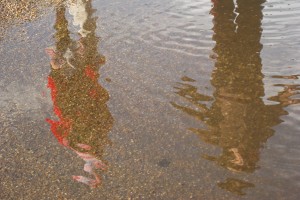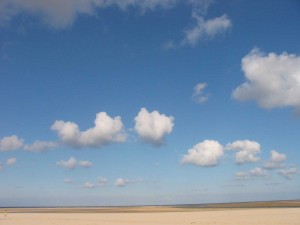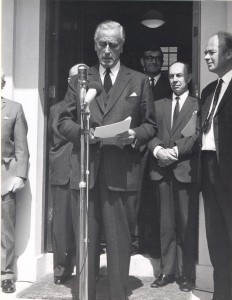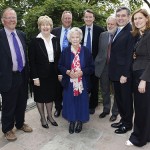
To what extent does the OU’s wider student population reflect the groups who make up the wider population? Has it been open to all people?
‘We are open, first as to people’ said Lord Crowther in his inaugural speech at the OU. He saw
the first, and most urgent task before us is to cater for the many thousands of people, fully capable of higher education, who for one reason or another, do not get it, or get as much of it as they can turn to advantage ,or as they discover, sometimes too late, that they need.
This echoed Harold Wilson who, speaking to the Labour Party conference at Scarborough in 1963, proposed to offer opportunities to ‘those who for one reason or another, have not been able to take advantage of higher education’. However, just who these people were was not always clear. Most of the population had not been selected for grammar school or had not cleared the hurdles of ‘O’ levels, ‘A’ levels or university entry. Wilson had referred that year, in a speech in Glasgow, to ‘technicians and technologists who left school at 16 or 17’ and ‘others’ who had not sat ‘O’ or ‘A’ levels. He had claimed that ‘we are working [for] a dynamic programme providing facilities for home study to university and higher technical standards on the basis of a University of the Air and of nationally organised correspondence college courses’. At Scarborough he was more generalised. He suggested that this new institution could
could make an immeasurable contribution to the cultural life of our country and to the enrichment of our standard of living [we] simply cannot as a nation afford to cut off three quarters or more of our children from virtually any chance of higher education. The Russians do not, the Germans do not, the Americans do not and the Japanese do not and we cannot afford to either.
In the commons Harold Wilson quoted a Guildhall lecture in which Professor Blackett had
shown how the children of manual workers, just as intelligent as those of professional workers, do not arrive at the point of entry to universities in anything like the same proportion. He said: It is clear that these vital, missing bright children of worker families, do not knock on the university door and get rejected: they just don’t knock (see Commons Debate, 19 November, 1963 accessed 5 May, 2010).
Wilson wanted to be associated with the provision of cost-effective, modern, flexible, standardised, vocational training for adults. His belief in the viability of these proposals (which were used to bolster Labour’s prospects during the general elections of 1964 and 1966) were derived from his understanding of the traditions of adult distance education developments abroad and at home, correspondence courses, adult education, radio and television and the widespread support for, and interest in, university education which characterised the period.
The Labour Party had long sought to help make citizens, in part through engagement with socially aspirational voters. He may have imagined that a university of the air would enable the Labour Party to couple the rapid growth in access to television to the use of the medium for educational purposes. It also ensured that it was linked to higher education during a time when there was widespread agreement that sound governance was reliant upon the state-aided diffusion of appropriate knowledge and that formal qualifications, professionalism and vocational training were of value. Through its support for a University of the Air, Labour became associated with economic regeneration, increasing productivity, engagement on the cultural and technological fronts of the Cold War, the elimination of social inequalities and the promotion of social justice. The plans may have been for it to be open to people, but quite who was left hanging in the same air as that where the university was to be built.
The 1966 White Paper on the OU concluded ‘that an estimate of the potential audience can only be guesswork’. The OU Planning Committee made a guess of 1,000,000 who were ‘willing and able to study’ and focused on professional groups, suggesting that 25,000 teachers would be interested. It argued that
we take it as axiomatic … that no formal qualifications would be required for registration as a student. Anyone could try his or her hand, and only failure to progress adequately would be a bar to continuation of studies (The Open University, Report of the Planning Committee to the Secretary of State for Education and Science, HMSO, London, 1969).
The National Institute for Adult Education proposed a figure of up to 450,000 who constituted a backlog (a notion addressed by Robbins) of those deprived of higher education. It concluded that
The main work of the Open University is to provide opportunities for all those who for any reason, have been or are being excluded from achieving their aims through an existing institution of higher education.
The open university as planned made little provision derived from these sources. Wilson’s solution was narrow because he had drawn on Labour’s Taylor Committee. This identified higher education with universities, marginalised the part-time route to degree level qualifications in technical colleges, and ignored the degree level courses taking place under the National Council for Technological Awards. The success of technical colleges in responding to demand and expanding in the 1950s was overlooked. Wilson took up the theme and preferring the glamour associated with television promoted a university which provided opportunities for the middle class. The deprived were not identified, their preferred options, the technical colleges were marginalised. They were not provided with mandatory grants but offered only discretionary local awards. Instead of supporting the education of the deprived by raising the school leaving age (something which had to wait for the Tories) another university, albeit one of the air, was opened.
Many of the limitations as to how far Wilson’s open university was open to all people were echoed by Jennie Lee. Her insistence on the OU being a university meant that it became difficult for it to redress the inbalance in opportunities which had been identified. Her vision of an open university may have derived from an idea that wider liberation can be attained through learning. This can be traced back to the radical writings of John Milton in the mid-seventeenth century through the late eighteenth century contributions of Tom Paine, Mary Wollstonecraft and William Godwin (which were taken up by Corresponding Societies) to Robert Owen’s supporters and the Chartists, who were associated with the slogan, ‘Bread, knowledge and freedom’. Dissenting religion, working class autodidacts, proletarian self-help groups, adult Sunday Schools, Labour Colleges and working class libraries were all familiar to Jennie Lee.
There was also a tradition of emancipation through learning which had been manifested through a range of university extension and extra-mural provision such as the virtual university (which was how Cardinal Newman described the University of London in the 1850s). The intention was often to equip members of the working class with the intellectual tools necessary for them to play a larger role within the governance of the country. Some universities worked in conjunction with the WEA or similar bodies and elements of openness were tried by other universities prior to the foundation of the OU. The notion of outreach, derived from the University missions and settlements of the nineteenth century, implied new students adapting to the university and accepting a common culture, to use Robbins’ term (see Higher Education Report, Chair Lionel Robbins, HMSO, London, 1963). Jennie Lee’s determination to avoid a ‘poor man’s university’ reflected her understanding of the history of adult education. Her personal experience, however, was of being a subsidised (thanks to the Carnegie Trust and the Fife Education Authority) full time student at a conventional university, Edinburgh. It was that experience which may have been of greater significance.
Others continued to promote conventional university values for the new university. During its first years the OU limited numbers to 25,000 on the foundation courses. There were quotas based on availability of places, occupation and place of residence counselling to help potential students decide if they were likely to benefit from work at university level and the advertising was placed in those places where it was likely to be seen by the educated such as libraries, schools and technical colleges. Only 5% of the first applicants were manual workers and 2% of the 42,000 applicants were deemed not to be able to demonstrate the appropriate aptitude. The OU received more applications from the south of England and there were quotas based on location and occupation. The largest quota was for teachers (30% of the places, even though 250 of the teacher entrants already had degrees. 10% of places were allocated to housewives and clerical and office staff, this constituted less than the percentage of those categories of people who had applied. The figures were tabulated in detail in an Open University press release dated August 1970. The overall effect was to offer opportunities to a very small number of working class students. Approximately the same number of graduates as manual workers were selected. The OU was more open to academics as over 2,500 worked for the OU, either as central academics, in the regional or national centres or as part-time Tutors.
Robbins showed that more than half the students on HNC and HND (Higher National Certificate or Diploma) courses were working class. To start an HNC or HND a person had to have ‘A’ levels or equivalent. Holders of a HND received two exemptions from OU courses and holders of an HNC, one exemption, unless the holder had an ‘exceptionally high pass’ (an OU pass degree was six credits, honours was eight). This, despite the fact that HMI considered an HNC as ‘approaching the level of a pass degree, though on a narrower front’. By contrast, holders of a teacher’s certificate who studied for a BA in educational studies could receive up to three credits even though to start at a college of education only 5 ‘O’ levels were needed.
While the trajectory of the OU was distinctive from those antecedents in terms of its structure, finance, means of delivery and assessment, it shared some elements with its 1960s contemporaries, the state-built new universities (see H Perkin, Innovation in higher education: new universities in the United Kingdom, OECD, Paris 1969). Its notion of open to people was a development of the ideas associated with Robbins, as outlined in 1963. For Robbins the main aims of universities were ‘the instruction in skills suitable to play a part in the general division of labour’ and the promotion of ‘general powers of the mind’ to produce ‘civilised men and women’. He also called for the advancement of learning and discovery and ‘the transmission of a common culture and common standards of citizenship’. While during the early years of the OU the idea of a ‘common culture’ within the UK was undermined and being ‘open to people’ came to involve the university making the changes to itself in order to widen participation, the OU was framed by such ideas regarding the transmission of cultural values.
Evidence soon indicated that the commitment to improve access was difficult to realise, perhaps because of its structure. In 1975 Naomi McIntosh suggested that while ‘students are apparently being given an opportunity but for many it is not a real opportunity [many students] discover that the open door is simply a revolving door’ (Naomi E McIntosh, ‘Open admission – an open or revolving door?’, Universities Quarterly, 29, 2, Spring 1975 , pp171- 181 (pp. 179,181).). The problem was partly due to who was aware of the opportunities that the OU offered (at first its only display advertisements were in the Radio Times, plans for cartoons in the Daily Mirror never materialized) partly due to tensions identified by Halsey who noted that the very title of the OU was paradoxical in that ‘Open’ implies opportunities for the educationally disadvantaged while ‘University’ suggests academic standards comparable with other universities (see A H Halsey, A Heath and J M Ridge, Origins and destinations: family, class and education in modern Britain, Clarendon Press, Oxford, 1980).
Since its opening there has been a shift in both what ‘open’ might mean and what a ‘university’ is. New management models have propelled state-controlled, educational institutions such as the OU towards behaving as entrepreneurial actors within global markets. The OU was particularly susceptible to pressure as it was created in a unique manner, with a grant direct from the DES. Globalisation, shifting funding streams and business models, changes in demographics and the increasing impact of new technologies placed the notion of ‘open to people’ in a new context. In the 1970s universities were neither highly co-operative nor bitterly divided. Rather, they tended to exchange of information and knowledge within a regulated, state-funded, sheltered market where competition was not likely to aid success. By the 1990s technological innovation and the need to generate new funding, led to both increased competition and also co-operation. In 1998, following earlier negotiations, a number of European education Ministers committed themselves, in the Sorbonne Declaration, to harmonising the architecture of the European Higher Education system. A European Higher Education Area was created to ensure compatibility across the EU as to student workload, degrees and quality assurance standards and to define competence-orientated learning outcomes in each subject area. Coalitions were formed to compete for joint research proposals and to aid knowledge transfer from science to business. As universities became both more similar and more competitive, the OU became both more open to people, and also less open to them.
When Ron Dearing’s National Committee of Inquiry into Higher Education reported in 1997 it commended four different main ‘aims and purposes’ for universities. They had ‘to inspire and enable individuals to develop’, to ‘increase knowledge and understanding’ serve the needs of a ‘sustainable, knowledge-based economy’ and also ‘play a major role in shaping a democratic, civilised, inclusive society’. This fourth purpose indicates some of the wider changes since Robbins and suggests that the OU’s model, and it struggles to be open to people, may have been an influence on these revisions of the idea of the university (NCIHE, Higher Education in the Learning Society, Chair Ron Dearing, HMSO, London, July 1997, para. 5-11ff pp. 72-81). Dearing’s vision of a new relationship between universities and society was prefigured by the Delores Commission report for UNESCO in education for the twenty-first century. This called universities to be ‘a place of culture and learning for all’ and for all universities to be open (J Delors, et al, Learning: the treasure within, 1996, p. 134). Being open to people was now part of the mainstream but, as in the past, some were excluded from the group to which universities were to be open.
Open to people can be employed to mean more than access, outreach and inter-university reciprocity. It can also be about participation. In the 1960s Michael Young envisaged ‘teaching machines and programmed textbooks’ at the National Extension College (Michael Young’ Announcing the National Extension College’, Where? 14, Autumn 1963, 14, p. 16) while the DES had expressed interest in ‘teaching machines’ and programmed learning as the Minister made clear in the Commons, 3 March, 1966, (accessed 5 May 2010). At first many within the OU favoured such ideas, seeing the benefits of allowing students to study at their own pace.
A study of two early courses, D102 and A101, concluded that the OU’s conception of knowledge and the generation of knowledge, was ‘inimical to what we think of as university study and discourse’. It was also suggested that the OU had undermined the educational democracy of the WEA traditions, by ensuring that the knowledge and decisions about knowledge were separated from both tutors and students. The effect of the OU’s system is ‘to constitute the students as a mass and the tutorial staff as a powerless subordinate priesthood’ (Geoffrey Wood, ‘Does distance lend enchantment? The politics of knowledge at the Open University’, Universities Quarterly Culture Education & Society, 39, 2 Spring 1985, pp127-148 (pp. 127, 134-135).). While such a start may not have been very auspicious in terms of being open to people, it was not long before the OU has started to move away from the belief that there is one right way to do things, that the educator holds the knowledge about how the students should learn and is the best person to provide the map of their studies. The idea of student-led learning rather than provider-led teaching, the emphasis on learner control, the foregrounding of the dialogic dimensions of learning, the shift towards diversity and personalisation and constructivist approaches which acknowledge the role of the individual’s experience in the learning process, may have made the OU more open to people in ways that the founders did not envisage.
Other developments which have opened up the OU to some people may have a detrimental effect for others. In 2006 Ormond Simpson suggested that for many years efforts to widen participation were ad hoc, low budget, sporadic, short term and poorly evaluated and that even when, in the early 21st century, there were attempts to widen participation, issues of literacies and perceptions of learning were often marginalised. Moreover, he concluded that the requirement that all students have access to the internet would restrict the OU’s widening participation mission so effectively that it would become ‘just another university’ (Ormond Simpson, ‘This door is alarmed’: 35 years of attempting to widen participation in the UKOU, Journal of Access Policy and Practice, 3, 2, August 2006, pp. 185-199). Social networking for learning and other changes can be used to create communities, generate content, discover resources, learn collaboratively, and utilise the power of the network. However, if they are to be open, flexible, democratic or pedagogically driven, disruptive rather than sustaining (to use Christensen’s terms here) the commitment to being open to people needs to be embedded. Engagement with web 2.0 technologies and approaches is not inherently open to people.
In 1969 the idea of a university which was ‘open to people’, encouraged access, supported a variety of students through their courses and promoted an ethos which enabled students to come to their own conclusions may have looked achievable, despite the structure and ethos. Forty years later the political and pedagogic framework has shifted and the same concept of openness may no longer be either achievable or desirable.
This posting has introduced a few ideas about what openness to people might mean. It could well be improved by comments. These are welcomed.



